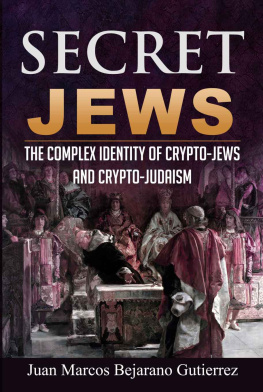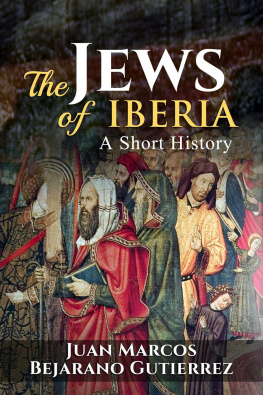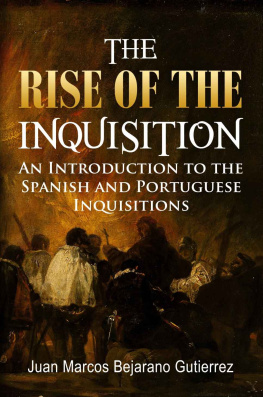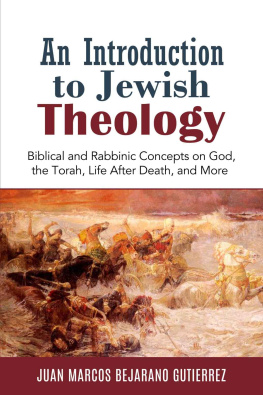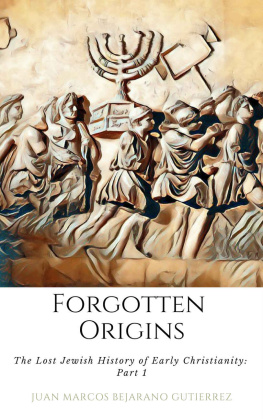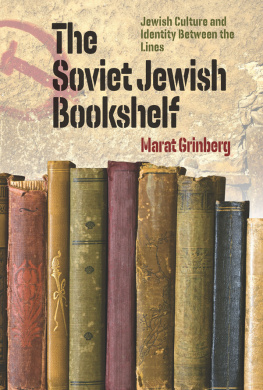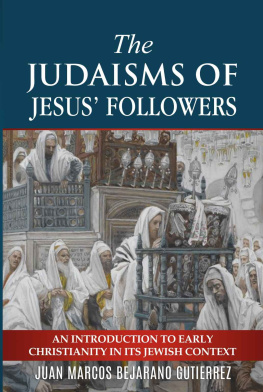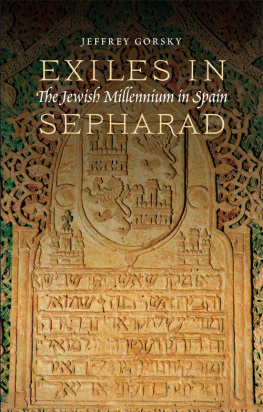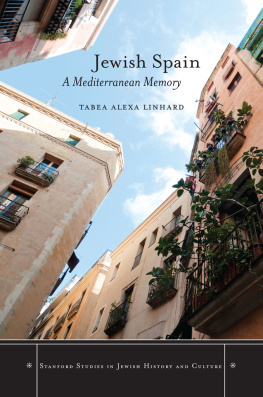Secret Jews
The complex identity of Crypto-jews and crypto-judaism
Juan Marcos Bejarano Gutierrez
Yaron Publishing
GRAND PRAIRIE, TEXAS
Copyright 2017 by Juan Marcos Bejarano Gutierrez.
All rights reserved. No part of this publication may be reproduced, distributed or transmitted in any form or by any means, including photocopying, recording, or other electronic or mechanical methods, without the prior written permission of the publisher, except in the case of brief quotations embodied in critical reviews and certain other noncommercial uses permitted by copyright law. For permission requests, write to the publisher, addressed Attention: Permissions Coordinator, at the address below.
Juan Marcos Bejarano Gutierrez/Yaron Publishing
701 Forest Park Place
Grand Prairie, Tx 75052
www.cryptojewisheducation.com
Book Layout 2017 BookDesignTemplates.com
Ordering Information:
Quantity sales. Special discounts are available on quantity purchases by corporations, associations, and others. For details, contact the Special Sales Department at the address above.
Secret Jews/ Juan Marcos Bejarano Gutierrez. 1st ed.
ISB N 978-1539620877
Cover image: Expulsin de los judos de Espaa (ao de 1492) by Emilio Sala Francs (18501910).
Contents
To Dr. Harvey P. Oshman
"A good name is rather to be chosen than great riches, and loving favor rather than silver and gold.
Proverbs 22:1
ACKNOWLEDGMENTS
I had the privilege of knowing Harvey P. Oshman for more than 22 years. Despite our difference in ages, he befriended me. He had a profound influence on me in many areas of my life.
He appreciated my passion for the study of Judaism in general as well as Crypto-Judaism. He provided me with a letter of recommendation when I applied to the Siegal College of Judaic Studies. He contributed financially to my Jewish education. He helped me in business. He was one of the two witnesses who signed the ketubah at my wedding.
These are just a few of the practical ways that Harvey impacted my life. But his effect on me went far beyond academics. We talked about theology, politics, and life in general. He chastised me when I needed it, even if I did not like it. I hope that I am a better man today because of it. His passing in 2016 was a terrible loss for all who knew him.
I will always remember him, and his memory will indeed be a blessing.
Introduction
F or Jews, life in the Iberian Peninsula was never quite as idyllic as is often portrayed. Jews residing there had experienced early Christian anti-Judaism in the fourth century and had undergone persecution, forced conversions, and expulsions under the Christianized Visigoths in the sixth and seventh centuries. The Islamic conquest of Spain in the eighth century improved Jewish life and created a period of stability and growth. Jewish life under Islamic rule, however, was not devoid of its trials and misfortunes as experienced under the Almovarids in the eleventh century and the Almohades in the twelfth century. Islamic fortunes eventually declined in the Iberian Peninsula. In the transition between Islamic and Christian rule, Jews flourished as an essential minority for the emerging Christian kingdoms now dominating the Peninsula.
In 1391, a new period in the history of the Jews of Spain began. Jewish communities throughout the Peninsula except those in the Kingdom of Portugal were attacked. The violence was stoked by long-held Christian anti-Judaism and popular discontent. The violence forever altered the position of Jews in the Iberian Peninsula. Thousands of Jews were murdered, and many more converted to Christianity under the direct threat of violence or to forestall it. The scope of the attacks in 1391 overshadowed all past trials as well as achievements and initiated a social and religious crisis that would last for more than a century.
The Jews who converted to Christianity were known as Conversos or New Christians in Christian literature and primarily as anusim (i.e. forced converts) in Jewish texts. According to the Spanish monarchs Ferdinand and Isabella, Judaizing by Conversos was the primary reason for their decision to order the expulsion of all unbaptized Jews in 1492 from their Iberian and overseas dominions. They argued that some unbaptized Jews had aided and abetted Conversos in Judaizing. The only way to resolve the problem was the absolute separation of the two groups. The accusation was, in fact, true. Their solution to the problem was brutal.
The descendants of Jews who had survived the mass conversions of 1391 were given a choice between exile and conversion. Further conversions were also brought about by the expulsion decrees issued by the Kingdom of Portugal in 1497 and the Kingdom of Navarre in 1498. Many exiles from the Kingdoms of Castile and Aragon had taken refuge in those domains in the wake of the original expulsion orders. Those Jews who converted to forgo exile faced challenges with an anti-Converso sentiment very much alive and well despite the drastic moves taken by the Spanish monarchs. Such actions had included the creation of the Spanish Inquisition in 1478, which was already firmly focused on Conversos continuing to observe Jewish practices. In the Kingdom of Portugal, no real choice between exile and baptism was presented. Thousands of Jews expecting to leave the Kingdom were forcibly baptized and forbidden to leave. Since these refugees had lived openly as Jews, their ability to preserve Jewish identity secretly was much stronger than had been the case for Conversos in Castile and Aragon. The latter had already experienced a century of severe conditions resulting in a weakened state of Jewish identity.
The real religious identity of Conversos has often been the source of debate among scholars. Yitzhak Baer and Haim Beinart argued that Conversos were one with the Jewish people. According to their position, the Jewish community recognized that the choice to convert had been made under duress and that Conversos, on the whole, were insincere in their attachment to Christianity. For Baer and Beinart, the Inquisitional documents correctly testified to the Jewish practices of Conversos. The initial Conversos, as well as their descendants, remained faithful to Judaism to the best of their ability. In contrast, Benzion Netanyahu argued vociferously that outside of the first onslaught of 1391, the subsequent generations of Conversos were, in fact, sincere converts to Christianity. The Inquisitional records were nothing short of a farce. According to Netanyahu, while the first generation may have converted due to the threat of death, their children and grandchildren were sincere Christians. Netanyahu argued that whatever Crypto-Jewish practices existed were mainly due to the resentment stirred by unjust Inquisitional tactics. Netanyahu maintained that the Inquisition was not religiously motivated to extirpate the heresy of Judaizing. While a hatred of Judaism had motivated previous sentiments against Jews, Old Christians were now driven by anti-Semitism to destroy the Conversos as a social and economic class regardless of what religious beliefs they sincerely held.
In contrast to Netanyahus contentions, this study maintains that while there were certainly exceptions, most Conversos did retain essential elements of Jewish identity well beyond the years immediately following 1391. They did so despite challenging circumstances and the watchful eyes of local priests and bishops. Conversos had always been mindful that Old Christians (i.e. Christians prior to the violence of 1391 and effectively Gentile Christians) could rise violently against them as they had before. These concerns were proven to be correct several times throughout the fifteenth century in cities like Toledo, Ciudad Real, Crdoba, and in Lisbon in the early sixteenth century . That religious fervor did not solely motivate these outbreaks of violence was in due course admitted by the Christian populace. These persecutions were motivated in part by the resentment that many Old Christians felt towards Conversos because some had taken advantage of the new found social and economic opportunities open to them. In addition, recently converted Jews were suspected of continuing to practice Judaism secretly. Those who converted but observed Judaism clandestinely were known as Judaizers or Marranos meaning swine. The Old Christian population regarded Conversos and their descendants as Jews and treated them accordingly.
Next page
